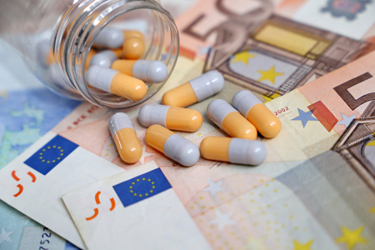Super Generics: Market Trends In Europe
By Sabyasachi Ghosh and Arun Kumar Gautam, Future Market Insights

The rise of super generics has ushered in a new age of innovation and competition in the European pharmaceutical sector. Historically, generic medications were considered nothing more than the copycat versions of their name-brand equivalents, reducing costs but not having the same therapeutic potential. However, super generics combine advanced formulations and delivery methods, and improved bioavailability, compared to traditional generics. These advanced pharmaceuticals are becoming increasingly important in determining the direction of the European healthcare sector as the need for reasonably priced, superior-quality drugs grows.
According to new market research from Future Market Insights, the super generics industry in Europe is predicted to surpass $14.2 billion by 2033, expanding at a 2.0% CAGR. Super generics outperform traditional generic models and are an influential force in the European pharmaceutical industry. The rising consumer awareness of super generic drugs, the prevalence of chronic diseases, and expanding geriatric populations contribute to this industry’s expansion.
The European Medicines Agency (EMA) and other regulatory organizations play a critical role in driving the expansion of the super generics industry. The EMA has established strict rules and standards to guarantee that these advanced generics fulfill uncompromising quality, safety, and efficacy requirements. This regulatory backing makes the research and marketing of super generics possible in Europe.
Let’s look at the key highlights of the super generics industry in Europe.
Macro Trends Influencing The Super Generics Industry In Europe
Online Pharmaceutical Retail Services Witnesses a Surge
In the pharmaceutical industry, the digital revolution has brought about a significant shift, with online services leading the way. Online pharmacies provide affordability, accessibility, and convenience, becoming a vital healthcare ecosystem component. Accordingly, super generics are positioned to take advantage of European online pharmacies' benefits. With surging investments in innovation and technology, Poland is becoming a super generic drug production hub.
Online pharmaceutical services come with a lot of benefits, but there are regulatory issues as well. Regulatory bodies place a high premium on ensuring the authenticity and quality of drugs sold online. It is critical to strike a balance between accessibility and security, and European regulatory agencies are actively striving to create rules that support online pharmacies operating responsibly.
Outsourcing Emerges as a Strategic Imperative
Outsourcing is now an economic imperative in the European pharmaceutical sector, and super generics are no exception. Partnering with specialized contract development and manufacturing organizations (CDMOs) has become an essential business strategy for enterprises in this industry. Super generic formulation frequently entails complex procedures that call for specific knowledge in medication production. Pharmaceutical businesses can leverage a plethora of expertise and abilities, shortening the time from research to market and guaranteeing that the finished product satisfies the highest quality requirements by outsourcing formulation development to seasoned CDMOs.
Technological Advancements Continue to Shape the Future
An imminent technology revolution can potentially influence the outlook of the super generics industry. Personalized medicine, formulation optimization, and drug discovery increasingly rely on artificial intelligence, machine learning, and data analytics as essential tools. These technical developments will improve the effectiveness of the development process for super generics and play a role in the broader growth of the European pharmaceutical business. Full-scale digital solution adoption might come with a hefty price tag, roughly $50 million to $100 million annually for two to three years, but the benefits can be substantial cost savings, enhanced resilience, better quality, and greater workforce effectiveness.
Super Generics Leverage Oral Medication Delivery
For a number of reasons, oral delivery — among topical, parenteral, and oral options — is the most widely used and practical way to administer medication. It is a physiological, painless, and noninvasive method of introducing both liquid and solid items into the body. When it comes to super generics, their primary objective of offering affordable substitutes for name-brand medications coincides perfectly with the ease of oral administration, which has a significant impact on patient adherence.
Regulatory agencies in Europe like the EMA often have well-established protocols and guidelines for oral medications, which makes it easier to approve pharmaceuticals that are administered in this way. When entering the super generics market, pharmaceutical companies often concentrate their efforts on oral formulations due to their familiarity with the regulations. This regulatory comfort helps companies enter the market faster.
Cardiology Takes Center Stage
Many indications, including oncology, cardiology, diabetes, neurology, gastroenterology, dermatology, analgesics and anti-inflammatory, weight management, ophthalmology, and other medical conditions, are treated using super generics. In Europe, however, cardiology makes the most extensive use of super generics. Cardiovascular disorders, including heart failure and hypertension, pose a serious threat to the region's health. Super generics, which provide therapeutic equivalency to branded cardiovascular medications at a more competitive price point, have become increasingly popular as a result of the growing emphasis on affordable healthcare options. Due to this financial benefit, the cardiology sector has become even more dominant in the market as consumers and healthcare providers look for more affordable, high-quality treatment alternatives.
Rising Diabetes Rates Spark A Surge In Anti-diabetic Super Generic Demand
In terms of medication classes, super generics provide a variety of choices, including antihistamines, anti-microtubule agents, aryl acetic acid derivatives, atypical antipsychotics, anti-diabetic and anti-obesity drugs, calcium channel blockers, corticosteroids, fabric acid agents, GABA analogs, opioid analgesics, proton pump inhibitors, retinoids, and others. Given the increasing frequency of diabetes in Europe, anti-diabetic medications are becoming increasingly popular and hold a significant industry share.
Opportunities to provide the public with reasonably priced medicine are abundant. Convenience and patient compliance can be enhanced by creating super generic medications that blend many anti-diabetic medication types into one product. Apart from conventional small molecule medications, it is crucial to be concerned about the proliferation of biosimilar variants of biological anti-diabetic medications. This biosimilar can provide more affordable alternatives to the biological therapies for diabetes that are now available, but the switch from originator biological product to a biosimilar or between different biosimilars can result in patient safety issues. Lack of awareness or misunderstanding about biosimilars can lead to uncertainties in the market.
Germany, The United Kingdom, And Poland Champion Super Generics Adoption Across Europe
Germany, the United Kingdom, and Poland are the top three countries in Europe for super generics consumption. This is a result of the drugs’ comparable effectiveness to name-brand medications and enhanced cost-effectiveness. These countries are the primary consumers in Europe because of their citizens' appreciation of the financial benefit and quality guarantee that super generics offer.
Poland's pharmaceutical industry has mushroomed in recent years, with 487 businesses operating there as of 2021. Because of this, super generics are finding it to be an increasingly profitable prospect.
The generic medication market in the United Kingdom is well-developed. Large, well-known generic corporations like Brown & Burk U.K. are present in this country. Because of changes in the competitive landscape, the generics industry in the United Kingdom is undergoing a considerable favorable change.
In Germany, the generics market already saves the government 5.7 billion euros a year on mandatory health insurance. Given that Germany boasts the largest pharmaceutical market in Europe, the super generics Industry stands to benefit from the increasing need for healthcare solutions.
In Spain, it is notable that though the demand for super generics is anticipated to rise at a 2.7% CAGR through 2034, the country’s strong inflation is affecting the demand.
Challenges And Future Considerations
Intellectual Property and Exclusivity Challenges
Navigating complicated intellectual property ecosystems is an issue that super generics companies frequently encounter. The industry's long-term viability depends on balancing promoting competition and upholding the original firms' intellectual property rights. Regulatory agencies are essential to maintaining intellectual property protection and promoting fair competition.
Pricing Pressures and Market Access Hindrances
Super generics' success is mostly attributed to their affordability. Pharmaceutical businesses in this field face problems due to market access issues and pricing constraints. To overcome these obstacles, industry players, government agencies, and healthcare providers must work together to create equitable pricing structures that guarantee accessibility and fund R&D initiatives.
Competitive Landscape
Key players in the super generics market are AbbVie, Sun Pharmaceutical Industries, Endo International, Viatris, Dr. Reddy’s Laboratories, Innovida Pharmaceutique, SERB Specialty Pharmaceuticals, Eagle Pharma, and Novartis AG.
Compared to makers of standard generics, companies that produce super generics have a higher regulatory risk when trying to obtain marketing permission. It takes a careful balance between pushing the envelope of innovation and adhering to regulatory norms to navigate this complex landscape. The ability to balance innovative concepts with a deep awareness of the regulatory environment is essential for success in such a volatile industry.
Final Words
The European super generics industry is at the nexus of innovation, cooperation, and technical development. Stakeholders must overcome obstacles and seize opportunities to promote a sustainable and patient-centered pharmaceutical environment, while online pharmaceutical services and outsourced pharmaceutical manufacturing continue to play critical roles in molding the industry.
Collaboration between regulatory agencies, business executives, and technological innovators is necessary to foster an atmosphere that supports the highest standards of safety and quality, promotes innovation, and guarantees patient access to reasonably priced pharmaceuticals. The path of the super generics industry is complex and dynamic. As it develops, it has the potential to offer revolutionary solutions that will benefit patients, healthcare providers, and the pharmaceutical industry as a whole in Europe.
About The Authors:
 Sabyasachi Ghosh is associate vice president of healthcare, medical devices, and pharmaceuticals at Future Market Insights. He has more than 12 years of experience in the industry and has been a researcher since the start of his career. His core expertise is in market entry and expansion strategy, feasibility studies, competitive intelligence, and strategic transformation. He holds a B.Sc. in microbiology. You can connect with him on LinkedIn.
Sabyasachi Ghosh is associate vice president of healthcare, medical devices, and pharmaceuticals at Future Market Insights. He has more than 12 years of experience in the industry and has been a researcher since the start of his career. His core expertise is in market entry and expansion strategy, feasibility studies, competitive intelligence, and strategic transformation. He holds a B.Sc. in microbiology. You can connect with him on LinkedIn.
Arun Kumar Gautam is a senior content writer at Future Market Insights.
